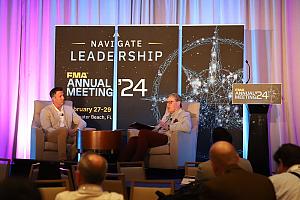- FMA
- The Fabricator
- FABTECH
- Canadian Metalworking
Clear cut
Alberta fabricator’s investment in 90,000 psi high pressure waterjet system—a first in Western Canada—leads to “huge savings”
- June 2, 2011
- News Release
- Fabricating
When the plant management team at Alco Industrial Equipment in Edmonton, AB, sat down to discuss changes in its fabricating operation, it wanted to cut costs, improve product quality and deliver faster turn around for its customers.
It realized those goals and more when it purchased a MultiCam 6000 dual head waterjet cutting system equipped with a KMT 90,000 psi Pro pump last fall.
When the waterjet system was installed in January 2011, Alco became the first company in Western Canada to use a high speed waterjet cutting system.
“One of the key things we evaluated was what we were farming out to other job shops,” says Rod Friesen, division manager for Alco. “We had substantial product going out to different waterjet companies. When we reviewed [the costs] we found we could acquire our own waterjet system for huge savings for our company.”
Alco Industrial Equipment is part of 67-year-old privately owned Alco Inc. Group of Companies. The organization operates six service, repair and manufacturing facilities in Edmonton and Red Deer, AB, and services the oil and gas, mining and power plant industries. Combined, the facilities are a “one stop shop” for customers, offering engineering, CNC machining, welding, fabricating (waterjet and plasma cutting, rolling and forming), and manufacturing of driveline products and crane servicing.
The fabrication shop services external and internal (from Alco’s other divisions) customers. Prior to the in-house waterjet cutting system, Alco was out-sourcing products developed by another company division that services the oil field industry-- the “Smart Roughneck” systems. Designed in-house, these are hydraulic or fully automated PLC-driven systems that eliminate the dangers involved with workers on drilling platforms.
To produce these smart roughneck systems, Alco Industrial Equipment first used its plasma cutting machine for part of the process, then outsourced the remaining fabricating job to local waterjet companies. Bringing the waterjet process in-house not only cut the costs of outsourcing, it improved cut quality and turn around of finished products.
“Now that we have our own waterjet system, we’re cutting product in a timely fashion,” says Friesen. “We can get an order on our desk on Monday and we’re delivering parts on Tuesday. With the other companies [outsourced waterjet cutting services], we were dealing with one and two week delays.”
Approximately 95 per cent of the material cut on the waterjet system is mild steel ranging in thickness from one quarter inch up to four and a half inches thick.
Michael Schlamp, shop foreman is impressed with the waterjet system’s user-friendliness and cutting performance.
“We’re doing a lot of internal work with the waterjet table with mining and process piping. We are B31.3 ASME certified [for process piping design/engineering/welding] and ISO 9001-2008 certified. The KMT/MultiCam people came in to install the system [installation was completed in two weeks] and did quite a bit of training. It’s a pretty easy system to work with; the nesting program for dual heads is easy to use. You just have to watch out for torch heights. The KMT pump is also easy to use. High pressure seals are quick to replace; it takes about 45 minutes to replace them, but it’s been a while since we’ve done that.”
On one particular job, cutting two-inch thick mild steel, Alco achieved tolerances within .006 in. “And there was no machining afterwards,” says Schlamp. “We’re getting work done quicker and we can get the quality that we want. We’re doing a lot of work for our 50th Street location. They were falling behind because our competitors [outsourced waterjet cutting shops] couldn’t meet the demands.”
Cutting speed and reduced garnet abrasive consumption are two other pluses, adds Friesen.
“On half inch material we’re running 1.6 in. of travel speed per minute and our garnet consumption is about 4.5 lb. per minute. We changed our garnet from 80 mesh to 50 mesh, so we’re now travelling faster with higher volume of garnet and higher volume of water, about 25 per cent faster with the 50 mesh.”
When Alco first began looking at the possibility of bringing waterjet cutting in-house, there were several specific criteria the new waterjet cutting system had to meet. It had to have the ability to cut multiples and thicknesses up to five in. mild steel. Alco wanted a system that required minimal maintenance and an environmentally friendly closed loop water and garnet cleaning system.
“Prior to the final selection of a waterjet cutting system, Alco reviewed three different waterjet manufacturers,” recalls Friesen. “At the time, we were only considering the 60,000 psi units. We requested information from each supplier and MultiCam/KMT were the first to provide the information package on the 90,000 psi unit.”
MultiCam was also the first to visit Alco to discuss options, view the area where the waterjet would be installed “and review our parts to determine what unit would best suit our needs.”
And while price and delivery also played a role in Alco’s decision to go with the MultiCam/KMT waterjet system, Friesen says the supplier’s commitment to service was key to the decision to invest close to $500,000.
“We expect our ROI to be less than five years.”
That’s because now that the system is up and running and has proven to be a high performance cutting unit, Alco is starting to use the new equipment for outside customers.
“Our customers are asking us to provide quotes. The opportunity to provide our customers with yet another offering at a competitive price will certainly increase our sales,” predicts Friesen. It also means the company can now become a one-stop shop for engineering, machining, metal fabricating and welding.
Byron Machado, KMT’s area manager involved in the installation, says Alco chose to upgrade from the initial 60,000 psi waterjet system it was considering to the 90,000 psi because of the many competitive advantages it could provide the company with.
“Increased productivity (Alco was able to take a two shift operation down to one) and reduced cost per part. You are still selling the same widget for $10 but you’re cutting more widgets in the same hour for less money for each.”
He adds that you use up to 40 to 50 per cent less abrasive per cut and there is no heat transfer to materials. With other technologies like plasma, oxyfuel and laser, heat is transferred to the part causing a change in the structural integrity of metals. And 90,000 psi reduces overall taper in a part when compared to 60,000 psi, explains Machado.
Asked if Alco is considering adding more waterjet equipment to its operation, Friesen says it’s a little early to say for sure, but “given the opportunity, I’m sure our owner would consider a unit for our oil and gas division.” CM
To see product report click HERE.
subscribe now


Keep up to date with the latest news, events, and technology for all things metal from our pair of monthly magazines written specifically for Canadian manufacturers!
Start Your Free Subscription- Industry Events
MME Saskatoon
- May 28, 2024
- Saskatoon, SK Canada
CME's Health & Safety Symposium for Manufacturers
- May 29, 2024
- Mississauga, ON Canada
DiPaolo Machine Tools Open House 2024
- June 4 - 5, 2024
- Mississauga, ON Canada
FABTECH Canada
- June 11 - 13, 2024
- Toronto, ON Canada
Zoller Open House & Technology Days 2024
- June 12 - 13, 2024
- Ann Arbor, MI





















